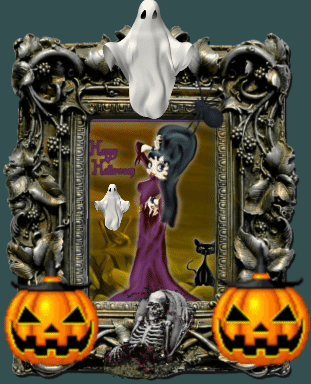SHANGRALA'S

Origins
Of
Halloween
Spooks!

Costumes impersonating spooky monsters such as vampires, witches, ghosts,
and mummies are always among the most popular. These and other scary
characters have become long-standing symbols of Halloween, but do you know
where these Halloween creatures originated from?
Check Out The History Of These Spooks. Enjoy! :)

Jack-o'-lantern: Did you know that the original jack-o'-lanterns were
carved out of turnips and not pumpkins?
This Halloween mascot had originated from an Irish legend. According to the
old tale, a man named Stingy Jack tried to trick the devil, but instead, he
was doomed to roam the earth forever with only a carved turnip to light his
path. When the first Irish settlers came to America, they immediately
discovered that pumpkins - a squash type native to America - made a
superior lantern. Thus, the modern-day jack-o'-lantern was born.

Werewolves: Werewolves are truly as old as time. Ancient history is full
of shapeshifters, but the first mention of a proper werewolf - a human who
turns into a wolf - was mentioned in The Epic of Gilgamesh, a text from
ancient Mesopotamia that dates back to 2100-1200 BC! In the story, a
goddess turns her ex-lover, a shepherd, into a wolf.
There are also mentions of similar creatures in Ancient Greek and Roman myths,
but they're "only" two thousand years old. Native American legends, Norse
myths, and many other world traditions also describe werewolf-like creatures.
Interestingly, some of these myths were likely driven by actual biology, as
people affected by rabies were known to experience a sudden outburst of
animalistic rage and go on violent rampages.

Vampire: We have to thank Slavic folklore for the invention of the vampire.
These early Eastern European vampires were pale and fed on human blood, but
they were actually short and stocky and not tall and skinny like the vampires
we see in movies. Slavic folks explained contagious diseases through the
existence of these early vampires.
But it was an Irish author named Bram Stoker and his 1897 novel Dracula that
solidified the image of the vampire on a global level. Inspired by Slavic
folklore and stories about the Transilvanian count Vlad the Impaler, Stoker
invented Dracula - everyone's favorite nosferatu.

Zombie: Zombies have been definitely gaining in popularity in recent years,
as evident by countless recent film and TV adaptations about them. These
creepy albeit quite slow brain-eating monsters are Haitian in origin. The
zombie (originally called zonbi in Haitian Creole) is a corpse brought
back to life by Voodoo practitioners called bokors.
Once revived, this early zombie found itself under the control of the bokor,
who snatched his soul through black magic. This is very different from the
zombies we see in modern film adaptions, which are created by mysterious
diseases and not sorcery.

Bloody Mary: Like The legend says that if you sit down in a dark room, place
a candle in front of the mirror, and chant Bloody Mary several times, a
mysterious woman will appear in the mirror. Sometimes, she is described as
a benevolent spirit, but most legends say that Bloody Mary is a bad ghost
that may curse or hurt whoever is summoning her.
Some historical accounts suggest that Bloody Mary refers to the English Queen
Mary I, who had the same nickname because she had executed hundreds of
protestants during her reign as the first female English monarch.

The Headless Horseman: The Headless Horseman is one of those rare monsters
that can be traced to a single source - the 1820 novel titled The Legend of
Sleepy Hollow by Washington Irving. Admittedly, Irving was probably inspired
by the Irish legend about the dullahan - a headless rider with his head in
one hand and a whip made of a human spine in the other. Similar legends have
been around in German and Scandinavian folklore too.
Source.

Ghosts: Much like werewolves, ghosts go way back in history. From invisible
poltergeists moving objects to mysterious transparent figures, ghosts show
up in some of the oldest texts and folk tales and literally every culture in
the world. The word ghost comes from the Old English word gast meaning spirit,
and it could refer to both good and bad spirits.
Fun fact: modern surveys reveal that nearly half of the American population
believes in ghosts, and one in five people believes they've seen a ghost.
Source.

Frankenstein: Like the Headless Horseman, Frankenstein is the invention of a
specific writer - Mary Shelley. In the 19th-century novel of the same name,
the monster was created by the mad scientist Victor Frankenstein. So, it's
actually more correct to say that the green hulking creature is Frankenstein's
monster. Of course, it's possible to argue that Dr. Frankenstein was indeed
the biggest monster in the book...
As for the name itself - Frankenstein - Shelly was likely inspired by the
Frankenstein Castle, an eerie abandoned castle in Germany.
Source.

Mummy: It's a well-known fact that Ancient Egyptians preserved the bodies of the
diseased through mummification - an intricate process that involved embalming
the body, wrapping it in pieces of cloth, and placing it in a sarcophagus in a
hidden tomb somewhere in the desert.
As the Egyptology craze swept through Europe in the 19th century, the concept of
a mummy's curse had also spread. Anyone who opened a sacred tomb would be doomed
to misfortune or even death - the people had thought. And the discovery of King
Tutankhamun's burial in 1922 further fueled the panic because Lord Carnarvon,
the patron of the expedition, died from blood poisoning 5 months after the tomb
had been opened.
Ever since then, mummies became a common horror trope, with our old friend Bram
Stoker's 1904 novel The Jewel of Seven Stars turning the mummy into a household
name.
Source.

Witch: Witches have a long-standing history in many cultures around the world.
The Slavic Baba Yaga, for example, lives in a hut standing on chicken legs and
flies in a giant mortar, whereas the Italian La Befana is actually a good
character who flies around on her broom delivering gifts to kids, just like
Santa Claus. Then, there's also the tragic history of witchhunts in the Middle
Ages that made the character part of the mass consciousness across Europe.
The modern idea of the witch is likely an amalgamation of several mythologies,
so it's difficult to pin down one source. What we know with fair certainty is
that the actual English word witch comes from the Old English word wicca - a
male practitioner of sorcery. So, believe it or not, the first witches were
actually men.
Source,
Top Image.
![]()
Share These Frights
With All Your Spooky Friends! :)

![]()
SEE ALSO: Folklore Monsters!

^BACK To TOP^

For those of you who Want More FUN - Visit The Shangy Fun List! Variety is the
spice of life! The Shangy Fun List is an ezine packed full of Poems, Inspirational and
Heart Warming Stories. Jokes from G to slightly R, and Anything else that just
might make you SMILE! Join In The Free FUN!! ... :)
Yes! Click Here To GO TO THE ARCHIVES!-
![]()
Like This Page?
If you are looking for more, here are some good places to start:

Bizarre Nature 4!-
Fearless Animals!-
Great White Shark!-
Aesop's Wise Fables!-
Christmas Monsters!-
Dangerous Critters 4!-
Macro Spider Photos!-
What Are The Odds?!-
Leopard Vs Crocodile!-
Darvaza - Door To Hell!-
Grizzly Bear Encounter!-
Scary Extinct Creatures!-
Enter At Your Own Risk!-
Up Close And Personal 3!-
Recent Brain Discoveries!-
Amazing Transformations!-
Creatures We Love To Hate!-
Science 2024 Breakthroughs!-
World's Strangest Materials!-
Little-Known UNESCO Sites!-
Dogs Find Baby Buried Alive!-
World's Deadliest Attractions!-
Shangrala's Fall/Halloween Index!-
A-Z Animated Picture Images!-


 -To SHANGRALA-
-To SHANGRALA-
SPECIAL THANKS Goes To JOHANNA For Sharing This With Us.
![]()
Copyright © 1996 Netscape Communications Corporation. Mozilla is
a trademark of Netscape Communications Corporation.
Note: This is an Unofficial God, Jesus Christ, Family, & Cartoon Fan Site.
© All graphics representing Disney characters are copyrighted by Disney.
Likewise all other graphics & music Copyright © by their own Individual Artists.
I do not own any graphics on this site. If you do, please notify me
and I'll give
you proper credit, a link, or remove it immediately according to your wishes.
~*~ Copyright © 1997-2025 Elrhea M. Bigham ~*~